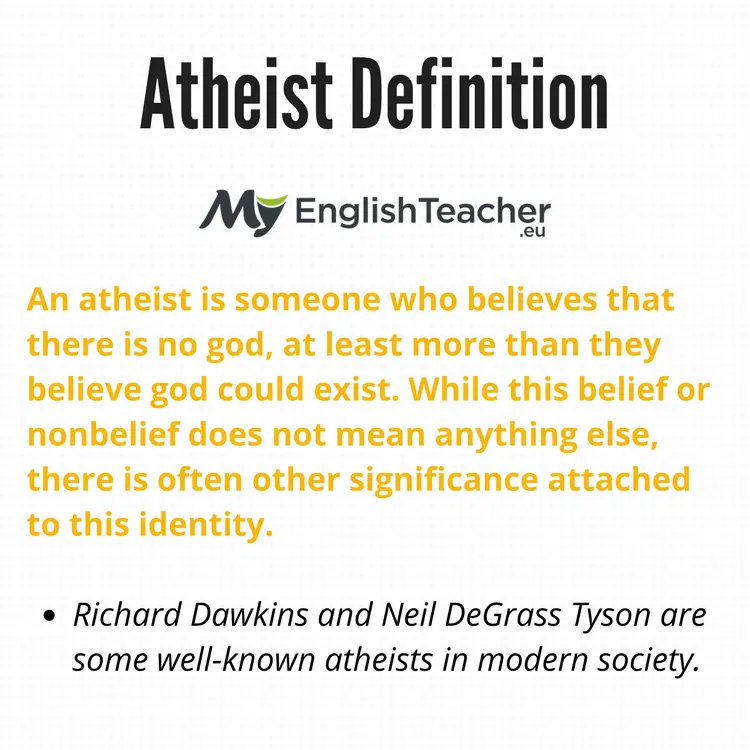
Any time that you talk about religion, you will have people who have strong opinions one way or the other.
In fact, religion – along with politics – tends to be one of the most taboo topics of conversation in modern society. There is almost nothing that sparks more controversy than it!
One of the big controversies in religion is whether religions and peoples’ belief in a higher power are founded on fact at all.
To say that you believe or do not believe in god or gods is a significant statement that comes with a lot of assumptions. Saying that you are atheist is one of these strong statements.
Meaning of Atheist
An atheist is someone who believes that there is no god, at least more than they believe god could exist. While this belief or nonbelief does not mean anything else, there is often other significance attached to this identity.
If someone says they areatheist, some people may be shocked, or think that this person has no moral compass or understanding of ethics. This is a common misconceived view in conservative areas where many people believe in some form of Christianity or Catholicism.
Typically,atheists are split into two groups. They can be either agnostic, or gnostic, depending on how strongly they hold their beliefs.
If they are more sure than not that there is no god, they are a gnostic atheist. If they are not sure but lean towards the belief there is no god, they are an agnostic atheist.
Atheist can be used as a noun to describe someone who does not believe in god or gods, or an adjective to describe these people or their actions.
Examples: Atheist in a sentence
- Richard Dawkins and Neil DeGrass Tyson are some well-known atheists in modern society.
- Some people believe that atheists will go to hell when they die, other people have no idea what to think, and some believe that there is no afterlife at all.
Dialogue
Taylor: Alex, would you be interested in going to church with me this Sunday? It is Easter, which is a big holiday in Christian tradition.
Alex: Thanks for the invitation! However, I am an atheist so I would be happy to meet up with you before or after church, but not at church itself.
Taylor: What do you mean?
Alex: Well, being an atheist means that I don’t think that there is a god.
Taylor: Wow, really? I have never met an atheist before. Why do you think that there is no god?
Alex: I am glad we are having this conversation, then! I have actually studied some parts of the Bible, Torah, and Quran and it does not add up to me. It just seems unlikely to me that there is a god, or that people were created at all.
Taylor: I see. Well, then how about we meet at the café near the university at noon on Sunday? I will be out of church service then.
Alex: Sure, I will see you then!
Other words you can create: noun, verb, adjective, adverb, etc.
Words that are derived from atheist include:
- Atheistic: the adjective form of atheist, though the word atheist itself can sometimes be used as an adjective.
- Atheism: the noun meaning the lack of belief in a higher, religious power.
Collocations
Common words that often go with atheist.
Confirmed atheist: someone who is a confirmed atheist is usually a well-known person who has announced publically that they are atheist.
- There are no confirmed atheists in our government.
- Even though many people suspect that Fred does not believe in a god, he is not a confirmed atheist.
Committed atheist: someone who is committed and convinced that there is no god.
- Hannah’s friends did not know that she was a committed atheist, because she never talked about it with them.
- Someone who is a newly committed atheist may indulge in online discussion forums with religious people, but someone with more experience knows that those are usually a waste of time. No one’s opinions will change.
Dedicated atheist: someone who is dedicated to their lack of belief in god.
- Someone who is a dedicated atheist may try to explain their thinking to anyone who will listen.
- Randy tried to hide the fact that he was a dedicated atheist from his family, but they found out when he kept refusing to go to church services with them.
Militant atheist: someone who is adamant about their lack of belief in god, and who can get into arguments online and in person about religion.
- There are plenty of militant religious people and militant atheists alike – and when they meet online, it can be a nasty affair.
- While it may sound bad to be a militant atheist, the most they do is usually speaking out against the harmful effects of religion, staying away from physical violence or harming other people directly.
Spiritual atheist: an atheist who believes in connecting with nature, other people, and spirits, excluding god or another higher power.
- Some people do not understand how others can be spiritual atheists, but they exist either way.
- There are people who do not completely identify with all the connotations and deeper implications that come with the word atheist. So, they say that they are spiritual atheists.
Synonyms
These are all the words that mean atheist, or something very similar.
Agnostic
An agonistic, or someone who is unsure of whether they believe there is a god or not, is often associated with an atheist.
The two groups of nonbelievers are often put together. However, the two do not describe the same thing. You can be an agnostic atheist, or a gnostic atheist, or an agnostic theist, or a gnostic theist.
- Some people who do not want to identify as atheist say that they are agnostic on the issue.
- The percentage of young people who say they are agnostic is higher now than ever before.
None
This is a term used often in surveys to put people in categories according to religious belief. If someone does not want to identify with a particular faith, such as Roman Catholic, Protestant, or Lutheran, or if they do not believe in a god at all, they are a “none”.
This term is sometimes used as a blanket term for everyone who has doubts about religion, including atheists, agnostics, and any other related group.
- The increase in proportion of “nones”, especially among the younger generation, has the church in a panic.
- If you are unsure how to identify, choosing “none” can be the best choice.
Non-believer
Someone who does not believe in religion, or does not believe in a god at all, is a non-believer.
- Many people who grew up in the church eventually become non-believers once they are exposed to the world outside their local community.
- Some church pastors preach that non-believers will all be sent to hell, so there is no reason not to believe in a god, if only to save your eternal self.
Skeptic
While this term has applications outside of religion (including pseudoscience), it is often used to describe people you are skeptical about the teachings of religion.
For example, they are the ones that try to poke holes in the arguments of avid believers, and may try to educate or debate others about their beliefs.
The term comes from the fact that they are often skeptical of what they are told, and prefer to find out things by themselves rather than blindly believe what other people teach them.
- Famous skeptics include Richard Dawkins or Teller from the magician duo Penn and Teller.
- Even if you do not stray from your religious belief, it is always good to approach something with a skeptic point and view, trying to figure out the truth for yourself.
Doubter
Someone who is often bringing up the opposite point of view is a doubter. While this sometimes has a negative meaning when talking about someone who doubts your abilities to do something or to succeed, it has a different meaning for religion.
In this religious context, being a doubter means that you doubt religion and things that others accept as truth.
- It is never a bad thing to be a doubter, so that you think critically about what you are committed to believing.
- When Xavier confessed to his ultra conservative parents that he had become a doubter, they immediately shunned him even though he had no decided whether to give up his faith.
Freethinker
This is another word to describe people who do not believe in religion, and is often associated with more positive feelings. A freethinker is someone who accepts many different things, and often is tolerant of what others believe.
They tend to be very liberal and can include those people who are constantly moving to different countries and holding down a series of odd jobs to make a living as well as doubters of religion.
- The first time I met a freethinker, I was fascinated, and surprised to find out that my cousin did not have the same reaction to the girl at all.
- To be a freethinker in itself is not a bad thing, but some people associate freethinking with loose morals, even if that association is without any real merit.
Common Sayings with Atheist
There are no atheists in foxholes.
This is one of the only sayings in English about atheists, and it is not a good one. It comes from the fact that atheists do not believe in an afterlife since they do not believe in a god.
As a result, some believers think that this makes them less likely to serve in the military. Foxholes are a type of defensive stance that service members sometimes use while in combat, and it refers to the military as a whole.
However, this saying is incorrect, and using it in some circles can show ignorance and narrow-mindedness.
- Bob wanted to show off his service and his faith, and kept saying that there are no atheists in foxholes. However, when an atheist general stepped forward about his nonbelief, Bob stopped saying that immediately.
- Some people who argue that the army should employ only religious chaplains claim that there are no atheists in foxholes.

























Atheist means a lack of belief in god or gods. A- means without, theist means a belief in god or gods.
Gnostic refers to a knowledge claim. Agnostic is without knowledge in something.
The militant atheist, committed atheist, and dedicated atheist are all terms religious people made up in order to attack atheists.
You seem to put believe there is no god in bold and yet a few paragraphs down you correctly state they simply do not believe. Please correct this egregious mistake.
https://en.oxforddictionaries.com/ Please stop misinforming people it is damaging to the public.